2019年中考英语倒装句语法讲解
英语倒装句的概述和用法
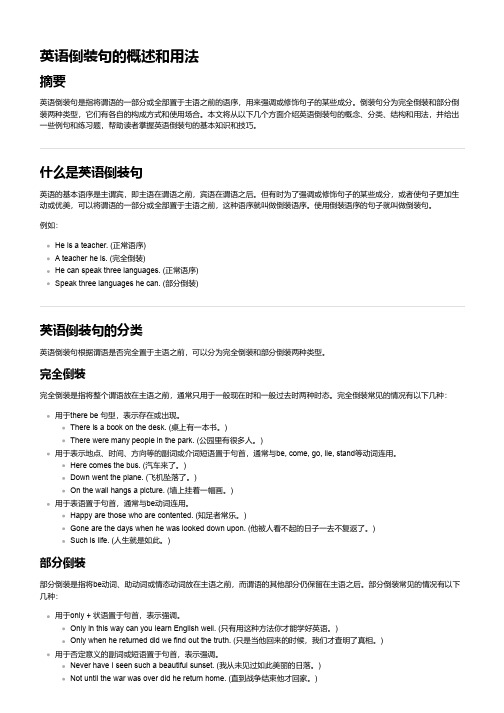
英语倒装句的概述和用法摘要英语倒装句是指将谓语的一部分或全部置于主语之前的语序,用来强调或修饰句子的某些成分。
倒装句分为完全倒装和部分倒装两种类型,它们有各自的构成方式和使用场合。
本文将从以下几个方面介绍英语倒装句的概念、分类、结构和用法,并给出一些例句和练习题,帮助读者掌握英语倒装句的基本知识和技巧。
什么是英语倒装句英语的基本语序是主谓宾,即主语在谓语之前,宾语在谓语之后。
但有时为了强调或修饰句子的某些成分,或者使句子更加生动或优美,可以将谓语的一部分或全部置于主语之前,这种语序就叫做倒装语序。
使用倒装语序的句子就叫做倒装句。
例如:He is a teacher. (正常语序)A teacher he is. (完全倒装)He can speak three languages. (正常语序)Speak three languages he can. (部分倒装)英语倒装句的分类英语倒装句根据谓语是否完全置于主语之前,可以分为完全倒装和部分倒装两种类型。
完全倒装完全倒装是指将整个谓语放在主语之前,通常只用于一般现在时和一般过去时两种时态。
完全倒装常见的情况有以下几种:用于there be 句型,表示存在或出现。
There is a book on the desk. (桌上有一本书。
)There were many people in the park. (公园里有很多人。
)用于表示地点、时间、方向等的副词或介词短语置于句首,通常与be, come, go, lie, stand等动词连用。
Here comes the bus. (汽车来了。
)Down went the plane. (飞机坠落了。
)On the wall hangs a picture. (墙上挂着一幅画。
)用于表语置于句首,通常与be动词连用。
Happy are those who are contented. (知足者常乐。
初中英语倒装句用法小结
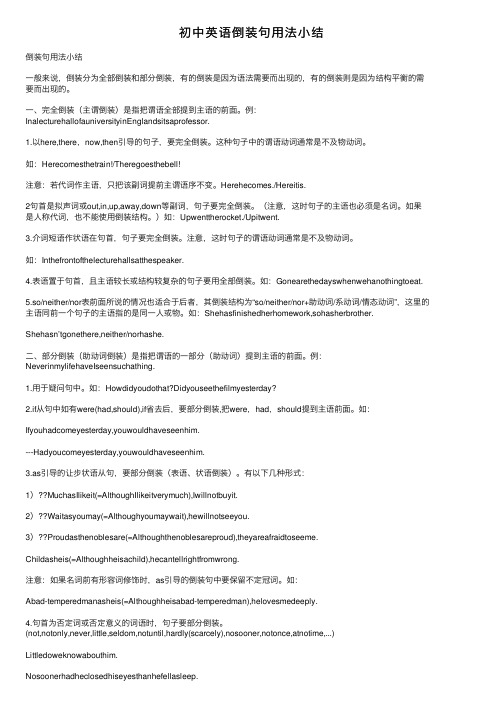
初中英语倒装句⽤法⼩结倒装句⽤法⼩结⼀般来说,倒装分为全部倒装和部分倒装,有的倒装是因为语法需要⽽出现的,有的倒装则是因为结构平衡的需要⽽出现的。
⼀、完全倒装(主谓倒装)是指把谓语全部提到主语的前⾯。
例:InalecturehallofauniversityinEnglandsitsaprofessor.1.以here,there,now,then引导的句⼦,要完全倒装。
这种句⼦中的谓语动词通常是不及物动词。
如:Herecomesthetrain!/Theregoesthebell!注意:若代词作主语,只把该副词提前主谓语序不变。
Herehecomes./Hereitis.2句⾸是拟声词或out,in,up,away,down等副词,句⼦要完全倒装。
(注意,这时句⼦的主语也必须是名词。
如果是⼈称代词,也不能使⽤倒装结构。
)如:Upwenttherocket./Upitwent.3.介词短语作状语在句⾸,句⼦要完全倒装。
注意,这时句⼦的谓语动词通常是不及物动词。
如:Inthefrontofthelecturehallsatthespeaker.4.表语置于句⾸,且主语较长或结构较复杂的句⼦要⽤全部倒装。
如:Gonearethedayswhenwehanothingtoeat.5.so/neither/nor表前⾯所说的情况也适合于后者,其倒装结构为“so/neither/nor+助动词/系动词/情态动词”,这⾥的主语同前⼀个句⼦的主语指的是同⼀⼈或物。
如:Shehasfinishedherhomework,sohasherbrother.Shehasn’tgonethere,neither/norhashe.⼆、部分倒装(助动词倒装)是指把谓语的⼀部分(助动词)提到主语的前⾯。
例:NeverinmylifehaveIseensuchathing.1.⽤于疑问句中。
如:Howdidyoudothat?Didyouseethefilmyesterday?2.if从句中如有were(had,should),if省去后,要部分倒装,把were,had,should提到主语前⾯。
初中英语知识点归纳倒装句的用法

初中英语知识点归纳倒装句的用法倒装句是英语语法中的一种特殊句型,与汉语中的语序相反。
在初中英语学习中,倒装句是一项重要的知识点。
本文将对初中英语知识点归纳倒装句的用法进行详细介绍。
一、完全倒装句完全倒装句的主谓语调换位置,句子的疑问词位于主语之前。
它常用于以下几种情况:1. 在以状语开头的句子中,如地点状语、时间状语等。
例如:Under the tree sat a little boy.(一棵树下坐着一个小男孩。
)In the garden were some beautiful flowers.(花园里有一些美丽的花。
)2. 在以否定副词开头的句子中,如never, seldom, rarely等。
例如:Never have I seen such a beautiful sunset.(我从未见过如此美丽的日落。
)Seldom does she go to the cinema on weekdays.(她平时很少去电影院。
)3. 在以“only”或“only+状语”开头的句子中。
例如:Only in this way can we solve the problem.(只有这样我们才能解决问题。
)Only by working hard can you achieve success.(只有努力工作你才能获得成功。
)二、部分倒装句部分倒装句是指将助动词或情态动词与主语调换位置,而将主要动词保持不变。
常见的情况有以下几种:1. 在以“否定词+动词”或“否定词+助动词+主词+动词”开头的句子中。
例如:Never have I been to Paris.(我从未去过巴黎。
)Not only did he learn English, but also he studied Spanish.(他不仅学英语,还学了西班牙语。
)2. 在以“so/such + adj./adv. + 主语”开头的句子中。
2019年涉及not,only…but,also…的部分倒装
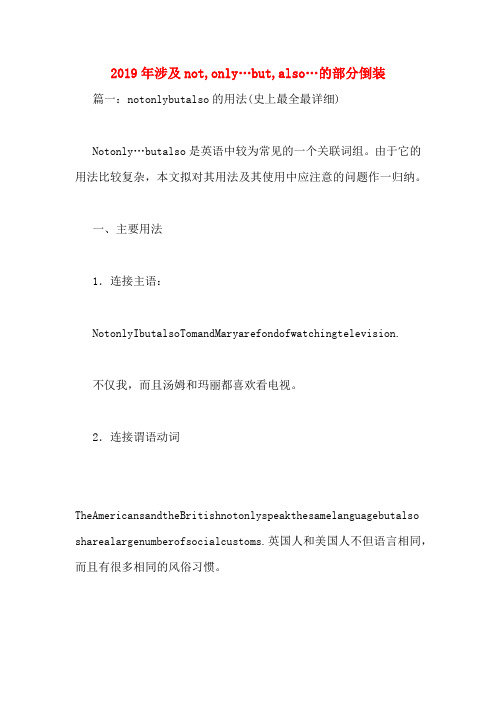
2019年涉及not,only…but,also…的部分倒装篇一:notonlybutalso的用法(史上最全最详细)Notonly…butalso是英语中较为常见的一个关联词组。
由于它的用法比较复杂,本文拟对其用法及其使用中应注意的问题作一归纳。
一、主要用法1.连接主语:NotonlyIbutalsoTomandMaryarefondofwatchingtelevision.不仅我,而且汤姆和玛丽都喜欢看电视。
2.连接谓语动词TheAmericansandtheBritishnotonlyspeakthesamelanguagebutalso sharealargenumberofsocialcustoms.英国人和美国人不但语言相同,而且有很多相同的风俗习惯。
注意notonly…butalso连接的动词一般不重复,这与汉语不同。
如汉语说“我不仅懂英语,而且懂俄语”,英语则说“IknownotonlyEnglishbutalsoRussian”,而不说“InotonlyknowEnglishbutalsoknowRussian”.再如:“气体不仅改变形状,而且改变体积”,英译为“Agaschangesnotonlyinshapebutalsoinvolume.”(注意介词常重复)3.连接宾语:Theproblemfortherecipientwastryingtoguessnotonlywhothesende rwas,butalsowhathissecretfeelingsmightbe.收信人不仅要尽力猜出是谁的,还要推测寄信人内心有什么想法。
4.连接宾语补足语:Lightandbrightcolorsmakepeoplenotonlyhappierbutmoreactive.浅色和鲜艳的颜色不但使人看了高兴,也会使人更加活泼。
5.连接表语:Shakespearewasnotonlyawriterbut(also)anactor莎士比亚不仅是一位剧作家,而且是一位演员。
初三英语语法复习之法倒装句的使用有哪些
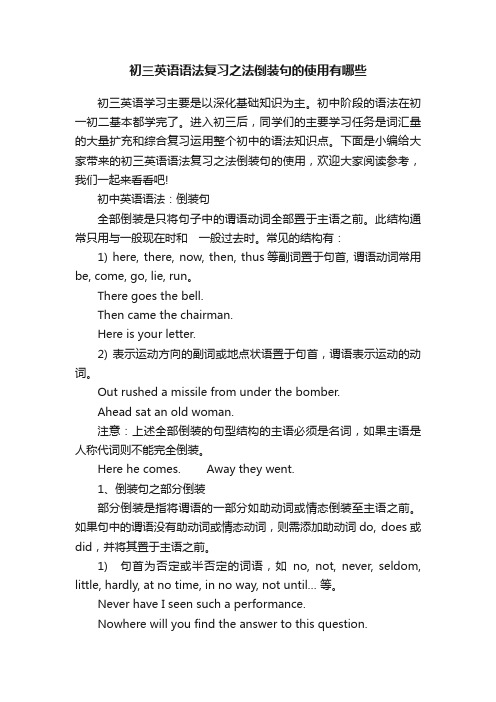
初三英语语法复习之法倒装句的使用有哪些初三英语学习主要是以深化基础知识为主。
初中阶段的语法在初一初二基本都学完了。
进入初三后,同学们的主要学习任务是词汇量的大量扩充和综合复习运用整个初中的语法知识点。
下面是小编给大家带来的初三英语语法复习之法倒装句的使用,欢迎大家阅读参考,我们一起来看看吧!初中英语语法:倒装句全部倒装是只将句子中的谓语动词全部置于主语之前。
此结构通常只用与一般现在时和一般过去时。
常见的结构有:1) here, there, now, then, thus等副词置于句首, 谓语动词常用be, come, go, lie, run。
There goes the bell.Then came the chairman.Here is your letter.2) 表示运动方向的副词或地点状语置于句首,谓语表示运动的动词。
Out rushed a missile from under the bomber.Ahead sat an old woman.注意:上述全部倒装的句型结构的主语必须是名词,如果主语是人称代词则不能完全倒装。
Here he comes. Away they went.1、倒装句之部分倒装部分倒装是指将谓语的一部分如助动词或情态倒装至主语之前。
如果句中的谓语没有助动词或情态动词,则需添加助动词do, does或did,并将其置于主语之前。
1) 句首为否定或半否定的词语,如no, not, never, seldom, little, hardly, at no time, in no way, not until… 等。
Never have I seen such a performance.Nowhere will you find the answer to this question.Not until the child fell asleep did the mother leave the room.当Not until引出主从复合句,主句倒装,从句不倒装。
中考英语语法之倒装句用法详解及练习分析
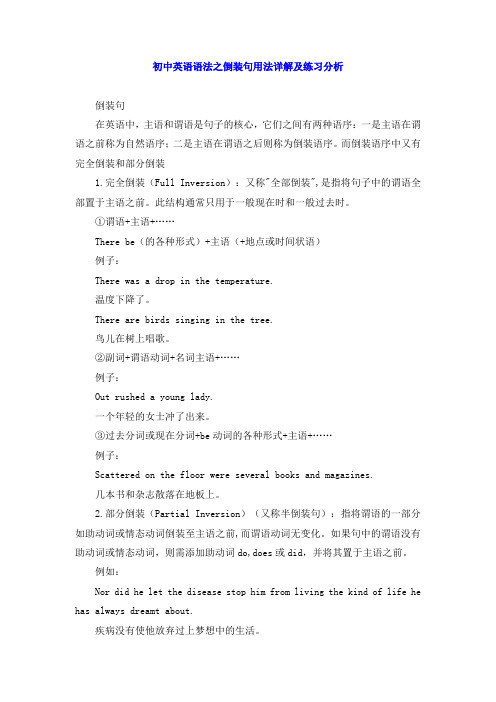
初中英语语法之倒装句用法详解及练习分析倒装句在英语中,主语和谓语是句子的核心,它们之间有两种语序:一是主语在谓语之前称为自然语序;二是主语在谓语之后则称为倒装语序。
而倒装语序中又有完全倒装和部分倒装1.完全倒装(Full Inversion):又称"全部倒装",是指将句子中的谓语全部置于主语之前。
此结构通常只用于一般现在时和一般过去时。
①谓语+主语+……There be(的各种形式)+主语(+地点或时间状语)例子:There was a drop in the temperature.温度下降了。
There are birds singing in the tree.鸟儿在树上唱歌。
②副词+谓语动词+名词主语+……例子:Out rushed a young lady.一个年轻的女士冲了出来。
③过去分词或现在分词+be动词的各种形式+主语+……例子:Scattered on the floor were several books and magazines.几本书和杂志散落在地板上。
2.部分倒装(Partial Inversion)(又称半倒装句):指将谓语的一部分如助动词或情态动词倒装至主语之前,而谓语动词无变化。
如果句中的谓语没有助动词或情态动词,则需添加助动词do,does或did,并将其置于主语之前。
例如:Nor did he let the disease stop him from living the kind of life he has always dreamt about.疾病没有使他放弃过上梦想中的生活。
部分倒装也有以下几种常见类型:1. 以否定词开头的句子要求部分倒装。
注意下列句子中助动词或情态动词提前、甚至补充助动词的用法:例:Not until yesterday did little John change his mind.小约翰直到昨天才改变了主意。
2019年中考英语语法倒装句讲解(带答案)
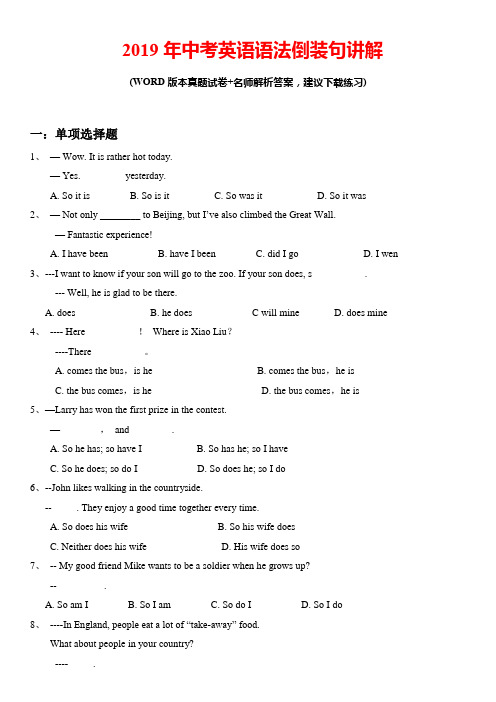
2019年中考英语语法倒装句讲解(WORD版本真题试卷+名师解析答案,建议下载练习)一:单项选择题1、— Wow. It is rather hot today.— Yes. ________ yesterday.A. So it isB. So is itC. So was itD. So it was2、—Not only ________ to Beijing, but I’ve also climbed the Great Wall.— Fantastic experience!A. I have beenB. have I beenC. did I goD. I wen3、---I want to know if your son will go to the zoo. If your son does, s __________.--- Well, he is glad to be there.A.doesB.he does Cwill mine D.does mine4、---- Here __________!Where is Xiao Liu?----There __________。
A. comes the bus,is heB. comes the bus,he isC. the bus comes,is heD. the bus comes,he is5、—Larry has won the first prize in the contest.—________,and ________.A.So he has; so have IB.So has he; so I haveC.So he does; so do ID.So does he; so I do6、--John likes walking in the countryside.--_____. They enjoy a good time together every time.A. So does his wifeB. So his wife doesC. Neither does his wifeD. His wife does so7、-- My good friend Mike wants to be a soldier when he grows up?-- _________.A. So am IB. So I amC. So do ID. So I do8、----In England, people eat a lot of ―take-away‖ food.What about people in your country?----_____.A. So we doB. We do soC. We so doD. So do we9、–English is quite useful.--_____.A. It is soB. So is itC. So it isD. Is it so10、—I’m not going swimming tomorrow afternoon.— ________. I have to clean up my bedroom.A. So am IB. Neither am IC. Neither I amD. S o I am11、----Peter, I will visit our teacher this Sunday.\----_______. Let’s go together.A. Nor do IB. I will doC. So will ID. So can I12、一Bill has finished his homework.一A.So does Mary B.Nor does Mary C.Neither has Mary.D.So has Mary 13、—Would your sister go for a picnic this Sunday?—If I don’t go,.A.neither does she B.so does she C.neither will she D.so has she 14、—They didn't visit Night Safari.did they?—No.they didn't.A.Neither they did B.Neither did usC.Neither we did D.Neither did we15、I'm not right.A. Either he isn'tB. He isn't right, tooC. Neither he isD. Neither is he16、-Jack has made great progress recently .-, and .A. So he has ; so you haveB. So he has ; so have youC. So has he; so have youD. So has he; so you have 8.17、John likes walking in the open air on weekends, _______.A. so does TomB. also does TomC. Tom likes alsoD. so Tom does18、—Do you know if your brother will go to the party? —If yours doesn’t, ______?A. so doesn’t mineB. so mine doesC. neither will mineD. neither mine will19、If you don’t go to see the film tonight, _______.A. so don’t IB. so won’t IC. neither do ID. neither will I20、—I’m not going swimming tomorrow afternoon.— ________. I have to clean up my bedroom.A. So am IB. Neither am IC. Neither I amD. So I am21、—Hi, Lucy. Have you finished your homework yet?—No, just a half. I am really bored with so much homework.—_____A.So do I.B.So am I.C.So I do.D.So I am.22、John likes walking in the open air on weekends, _______.A. so does TomB. also does TomC. Tom likes alsoD. so Tom does23、_____ at the news that I didn't know what to say to comfort her.A. So sad she lookedB. So sad did she lookC. So sadly she lookedD. So sadly did she look24、—I’m not going swimming tomorrow afternoon.— ________. I have to clean up my bedroom.A. So am IB. Neither am IC. Neither I amD. So I am25、Yao Ming works hard on his English and ________A.so Liu Xiang does B.so is Liu XiangC.so does Liu Xiang D.so Liu Xiang is26、---I don’t like action films. They are too noisy.---_________. I never watch action films.A. Neither do IB. Neither I doC. So do ID. So I do27. His uncle is a worker and has been working in the factory for more than ten years. _____.A. So is his auntB. So has his auntC. So his aunt doesD. So it is with his aunt28. Not once _____ their plan.A. did they changeB. they changedC. changed theyD. they did change29. —— Do you know Jim quarreled with his brother?I don't know, and ______ .A. nor don't I careB. nor do I careC. I don't care neitherD. I don't care also30. Not until he arrived home _____ he find that this wallet had been stolen.A. didB. wouldC. whenD. that31. —— This is one of the oldest trees in the world._____ such a big tree.A. Never I have seenB. I haven't never seenC. Never have I seenD. I have seen never32. Nowhere else in the world _____ cheaper tailoring(裁缝业,成衣业)than in Hong Kong.A. a tourist can findB. can a tourist findC. a tourist will findD. a tourist has found33. _____ succeed in doing anything.A. Only by working hard we canB. By only working hard we canC. Only we can by working hardD. Only by working hard can we34. _____ that we all went out,lying in the sun.A. So fine was the weatherB. So was the fine weatherC. The weather was so fine wasD. So the weather was tine35. ____ a nice man ____ that we all believe him.A. So,did he seemB. So,he seemedC. Such,he seemedD. Such,did he seem36. ——You seem to be an actor.____ . I have played many parts in a lot of films.A. So do IB. So am IC. So I doD. So I am37. Not only ____ working hard,but also ____ very polite.A. the boy is,he isB. is the boy,he isC. the boy is,is heD. is the boy,is he38. ____,he never seems able to do the work beautifully.A. Try as he doesB. As he triesC. Try as does heD. As try he does39. —— I cannot see the picture well from here.---- _____.A. Neither can t IB. Neither I canC. I can't neitherD. Neither can I40. —— You ought to have given them some advice---- _____, but who cared what I asked?A. So ought youB. So 1 oughtC. So it wasD. So I did41. So carelessly _____ that he almost killed himself.A. he drivesB. does he driveC. did he driveD. he drove42. Little _____ about his own health though he was very ill.A. he caredB. did he careC. he caresD. does he car43. Well ____ know him and well ____ know me.A. I did,he didB. did I,he didC. did I,did heD. I did,did he44. No sooner ____ they rushed out into the street.A. did they hear the news thanB. did they hear the news whenC. had they heard the news thanD. had they heard the news when45. Little wonder _____ up their hands in dismay.A. have some thrownB. some have thrownC. thrown some haveD. have thrown some46. ____,he would have passed the exam.A. If he were to studyB. If he studied hardC. Had he studied hardD. Should he study hard47. We were lucky enough,for no sooner _____ home _____ it rained.A. we returned,andB. we had returned,whenC. did we return,whenD. had we returned,than48. So little _____ agree on the plan that they could not settle their difference.A. did theyB. do theyC. they didD. they did not参考答案1-5C B C B A 6-10A CDCB11-15C DCDD16-20BACDB21-25BABBA26-30DABAC 31~35 CBDAD 36~40 DBADD 41~45 CBCCB 46~48CDAC。
中考英语语倒装句

Tom can speak French. So can Jack.
典型例题
---Do you know Jim quarrelled with his brother?
41. ( 2018 兰 州 35 题 ) Only yesCterd ay A find out that his purse wa s lost.
A. he was B. was he C. did he D. he did
42. ( 2017 天 水 47 题 ) — It's very co
ld in Shenyang in winter.
— A here.
A. So it is
B. So was it
C. So it does D. So does it
Only after being asked three times did he come to the meeting.
Only when he is seriously ill, does he ever stay in bed. 只有病得很重时,他才卧床休息
五、so, neither, nor倒装
---I don't know, _____.
A. nor don't I care B. nor do I care C. I don't care neither D. I don't care
also
答案:B. nor为增补意思"也不关心",因此句子应倒装。A错在用 don't 再次否定,
英语倒装句讲解
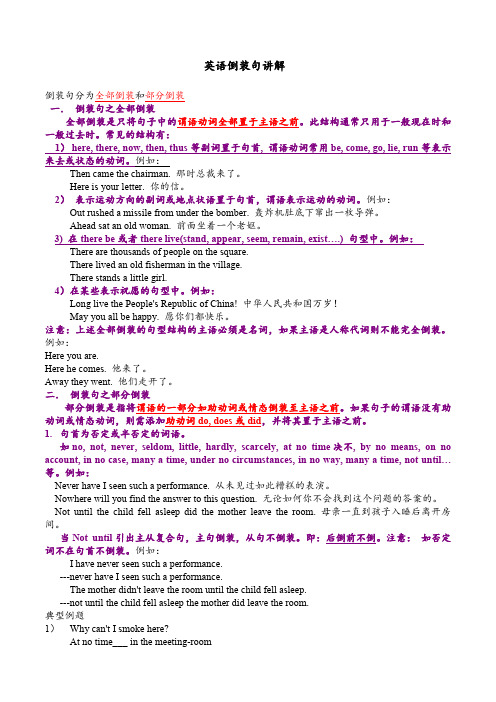
英语倒装句讲解倒装句分为全部倒装和部分倒装一.倒装句之全部倒装全部倒装是只将句子中的谓语动词全部置于主语之前。
此结构通常只用于一般现在时和一般过去时。
常见的结构有:1)here, there, now, then, thus等副词置于句首, 谓语动词常用be, come, go, lie, run等表示来去或状态的动词。
例如:Then came the chairman. 那时总裁来了。
Here is your letter. 你的信。
2)表示运动方向的副词或地点状语置于句首,谓语表示运动的动词。
例如:Out rushed a missile from under the bomber. 轰炸机肚底下窜出一枚导弹。
Ahead sat an old woman. 前面坐着一个老妪。
3) 在there be或者there live(stand, appear, seem, remain, exist….) 句型中。
例如:There are thousands of people on the square.There lived an old fisherman in the village.There stands a little girl.4)在某些表示祝愿的句型中。
例如:Long live the People's Republic of China! 中华人民共和国万岁!May you all be happy. 愿你们都快乐。
注意:上述全部倒装的句型结构的主语必须是名词,如果主语是人称代词则不能完全倒装。
例如:Here you are.Here he comes. 他来了。
Away they went. 他们走开了。
二.倒装句之部分倒装部分倒装是指将谓语的一部分如助动词或情态倒装至主语之前。
如果句子的谓语没有助动词或情态动词,则需添加助动词do, does或did,并将其置于主语之前。
(完整版)英语倒装句详解
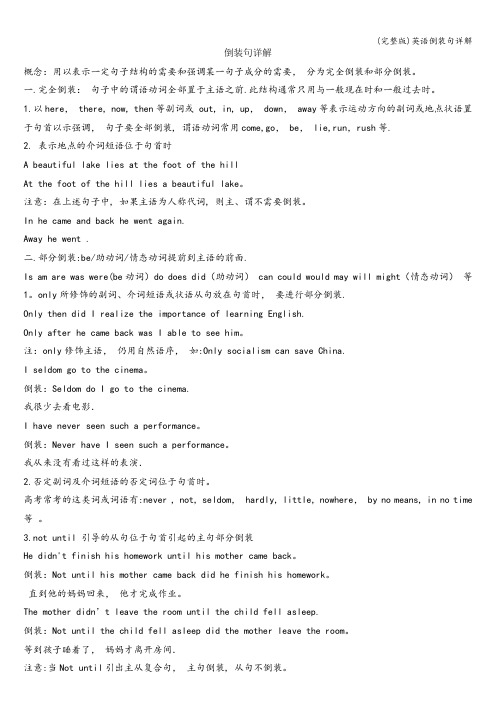
倒装句详解概念:用以表示一定句子结构的需要和强调某一句子成分的需要,分为完全倒装和部分倒装。
一.完全倒装:句子中的谓语动词全部置于主语之前.此结构通常只用与一般现在时和一般过去时。
1.以here, there, now, then等副词或 out, in, up, down, away等表示运动方向的副词或地点状语置于句首以示强调,句子要全部倒装, 谓语动词常用come,go, be, lie,run,rush等.2. 表示地点的介词短语位于句首时A beautiful lake lies at the foot of the hillAt the foot of the hill lies a beautiful lake。
注意:在上述句子中, 如果主语为人称代词, 则主、谓不需要倒装。
In he came and back he went again.Away he went .二.部分倒装:be/助动词/情态动词提前到主语的前面.Is am are was were(be动词)do does did(助动词) can could would may will might(情态动词)等1。
only所修饰的副词、介词短语或状语从句放在句首时,要进行部分倒装.Only then did I realize the importance of learning English.Only after he came back was I able to see him。
注:only修饰主语,仍用自然语序,如:Only socialism can save China.I seldom go to the cinema。
倒装:Seldom do I go to the cinema.我很少去看电影.I have never seen such a performance。
倒装:Never have I seen such a performance。
初中英语倒装句讲解
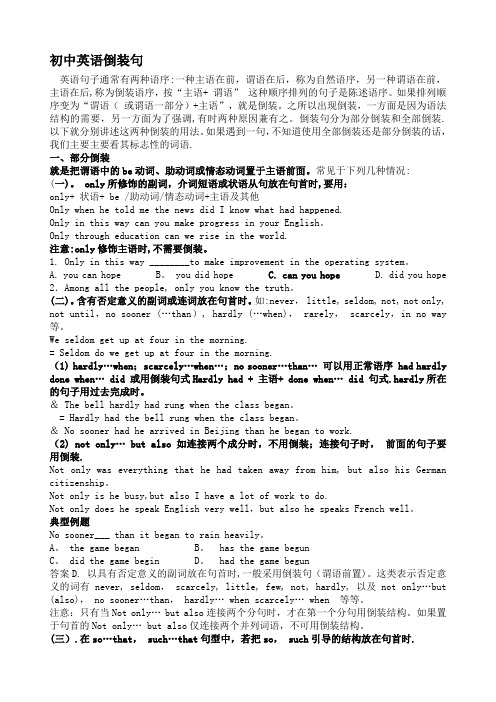
初中英语倒装句英语句子通常有两种语序:一种主语在前,谓语在后,称为自然语序,另一种谓语在前,主语在后,称为倒装语序,按“主语+ 谓语” 这种顺序排列的句子是陈述语序。
如果排列顺序变为“谓语(或谓语一部分)+主语”,就是倒装。
之所以出现倒装,一方面是因为语法结构的需要,另一方面为了强调,有时两种原因兼有之。
倒装句分为部分倒装和全部倒装.以下就分别讲述这两种倒装的用法。
如果遇到一句,不知道使用全部倒装还是部分倒装的话,我们主要主要看其标志性的词语.一、部分倒装就是把谓语中的be动词、助动词或情态动词置于主语前面。
常见于下列几种情况: (一)。
only所修饰的副词,介词短语或状语从句放在句首时,要用:only+ 状语+ be /助动词/情态动词+主语及其他Only when he told me the news did I know what had happened.Only in this way can you make progress in your English。
Only through education can we rise in the world.注意:only修饰主语时,不需要倒装。
1. Only in this way ________to make improvement in the operating system。
A. you can hope B。
you did hope C. can you hope D. did you hope 2.Among all the people, only you know the truth。
(二)。
含有否定意义的副词或连词放在句首时。
如:never, little, seldom, not, not only, not until,no sooner (…than), hardly (…when), rarely, scarcely,in no way 等。
初中英语:“倒装句精讲”,基本结构、例句分析、真题再现

初中英语:“倒装句精讲”,基本结构、例句分析、真题再现倒装句的概念英语句子通常有两种语序:一种主语在前,谓语在后,称为陈述语序;另一种谓语的一部分或整个谓语在前,主语在后,称为倒装语序(如英语的疑问句形式)。
在初中阶段倒装句一般都作为特殊句型来处理。
初中常见倒装句型1.So+be/助动词/情态动词+主语.表示“……也是这样”,用于描述谓语所说情况也适用于另一个人或另一件事物,只能用于肯定情况,注意上、下句所使用的动词的时态要一致。
例如You can ride a bike. So can I.你会骑自行车,我也会。
He has been to Beijing. So have I.他去过北京,我也去过。
Lin Ping was there last night. So was everyone else in my class.林平昨晚在那里,我们班其他人昨晚也都在那里。
He saw the snake, and so did I.他看见那条蛇了,我也看到了。
★注意:如果前一个句子有be、助动词(如have,will等)和情态动词(如can,must等),就把这些词放在另一个句子主语前。
如果前一个句子谓语动词是行为动词,后句中要把助动词do,does或did放在主语前,就像行为动词变疑问句一样。
★辨析:“So+主语+be/助动词/情态动词.”此句型不是倒装句,只是单纯地重复前面一句的意思,表示“的确如此;就是这样”。
例如—My little brother can swim in the sea.——我的小弟弟能在大海里游泳。
—So he can.——的确如此。
—He gets up very early.——他起得真早。
—So he does.——确实很早。
2.Neither/Nor+be/助动词/情态动词+主语.表示“……也不这样”。
用法和句型“So+be/助动词/情态动词+主语.”一样,只是意义上表示否定。
英语语法:倒装句的用法总结
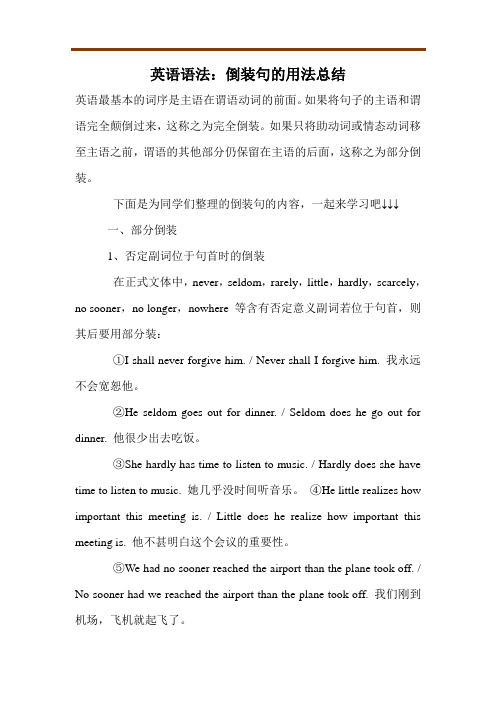
英语语法:倒装句的用法总结英语最基本的词序是主语在谓语动词的前面。
如果将句子的主语和谓语完全颠倒过来,这称之为完全倒装。
如果只将助动词或情态动词移至主语之前,谓语的其他部分仍保留在主语的后面,这称之为部分倒装。
下面是为同学们整理的倒装句的内容,一起来学习吧↓↓↓一、部分倒装1、否定副词位于句首时的倒装在正式文体中,never,seldom,rarely,little,hardly,scarcely,no sooner,no longer,nowhere 等含有否定意义副词若位于句首,则其后要用部分装:①I shall never forgive him. / Never shall I forgive him. 我永远不会宽恕他。
②He seldom goes out for dinner. / Seldom does he go out for dinner. 他很少出去吃饭。
③She hardly has time to listen to music. / Hardly does she have time to listen to music. 她几乎没时间听音乐。
④He little realizes how important this meeting is. / Little does he realize how important this meeting is. 他不甚明白这个会议的重要性。
⑤We had no sooner reached the airport than the plane took off. / No sooner had we reached the airport than the plane took off. 我们刚到机场,飞机就起飞了。
注意:(1)对于not…until句型,当not until…位于句首时,其后的主句要用倒装语序:He didn’t leave the room until the rain stopped. / Not until the rain stopped did he leave the room. 雨停了之后他才离开这房间。
初中知识点归纳倒装句的特殊用法与句型转换

初中知识点归纳倒装句的特殊用法与句型转换初中知识点归纳:倒装句的特殊用法与句型转换倒装句是英语中常见的一种句型结构,它在表达方式上与常规的主语-谓语-宾语结构不同,拥有一些特殊的用法与句型转换。
本文将对初中阶段学习的倒装句知识点进行归纳总结,以帮助同学们加深理解与运用。
一、完全倒装句完全倒装句是指将谓语动词的全部部分整体移到主语之前的句子结构。
通常在以下情况下使用完全倒装句:1. 否定副词位于句首当句子中含有否定副词"not"或者"never"时,常常使用完全倒装句,其结构为:“否定副词 + 谓语动词 + 主语”。
例:Not only does she play the violin, but she also sings beautifully.(她不仅演奏小提琴,而且歌唱得很好。
)2. 表达地点或方向的状语位于句首当句子以表示地点、方向的状语开头时,也需要使用完全倒装句。
常见的地点状语有"here"、 "there"、"in"等。
例:Here comes the bus.(车来了。
)There goes the bell.(钟声响了。
)3. 祈使句祈使句是用来表达命令、请求、建议等的句子类型,通常用于和对方交流。
在祈使句中,一般将谓语动词整体移到主语之前。
例:Open the window, please.(请打开窗户。
)Take care of yourself.(照顾好自己。
)二、部分倒装句部分倒装句是指将助动词或情态动词与主语交换位置所构成的句子结构。
部分倒装句通常在以下情况下使用:1. 含有否定词的句子当句子中含有否定词如"never"、"hardly"、"seldom"、"not"等时,常常使用部分倒装句,其结构为:“否定词 + 助动词/情态动词 + 主语 + 其他”。
【语法精讲】 英语倒装句总结,很全面!

语法精讲:英语倒装句总结倒装的种类英语最基本的词序是主语在谓语动词的前面。
如果将句子的主语和谓语完全颠倒过来,这称之为完全倒装。
如果只将助动词或情态动词移至主语之前,谓语的其他部分仍保留在主语的后面,这称之为部分倒装。
一.完全倒装完全倒装是将谓语的全部放在主语之前,此结构通常只用于一般现在时和一般过去时两种。
On her left sat her husband.她左边坐着她丈夫。
Here is the book you want.你要的书在这儿。
Down went the small boat.小船沉下去了。
二.部分倒装部分倒装是指将谓语的一部分,如助动词或情态动词,移至主语之前。
Only by working hard can one succeed.只有努力才能成功。
Never have I seen her before.我以前没见过她。
提示:如果句中的谓语没有助动词或情态动词,则需添加助动词do,does或did,并将其置于主语之前。
Well do I remember the day I joined the League.入团的那一天,我记忆犹新。
Little did I think that he could be back alive.我没有想到他竟能活着回来。
三.常见的倒装结构A.常见的完全倒装结构1.there be句型。
There is a mobile phone and some books on the desk.桌上有一个手机和一些书。
There are thousands of people gathering on the square.广场上聚集着成千上万的人。
注意:引导词there还可以接appear,exist,lie,remain,seem,stand,live等词。
There lived an old fisherman in the village.村里住着一位老渔夫。
2019中考初三英语语法:倒装句拒绝顺序
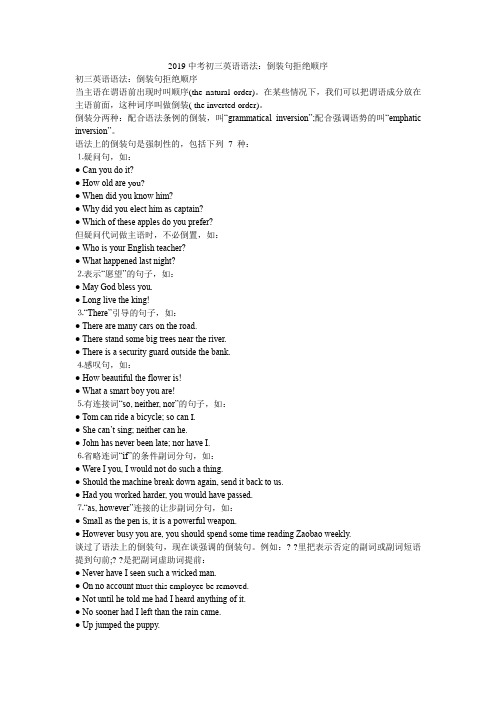
2019中考初三英语语法:倒装句拒绝顺序初三英语语法:倒装句拒绝顺序当主语在谓语前出现时叫顺序(the natural order)。
在某些情况下,我们可以把谓语成分放在主语前面,这种词序叫做倒装( the inverted order)。
倒装分两种:配合语法条例的倒装,叫“grammatical inversion”;配合强调语势的叫“emphatic inversion”。
语法上的倒装句是强制性的,包括下列7 种:⒈疑问句,如:● Can you do it?● How old are you?● When did you know him?● Why did you elect him as captain?● Which of these apples do you prefer?但疑问代词做主语时,不必倒置,如:● Who is your English teacher?● What happened last night?⒉表示“愿望”的句子,如:● May God bless you.● Long live the king!⒊“There”引导的句子,如:● There are many cars on the road.● There stand some big trees near the river.● There is a security guard outside the bank.⒋感叹句,如:● How beautiful the flower is!● What a smart boy you are!⒌有连接词“so, neither, nor”的句子,如:● Tom can ride a bicycle; so can I.● She can’t sing; neither can he.● John has never been late; nor have I.⒍省略连词“if”的条件副词分句,如:● Were I you, I would not do such a thing.● Should the machine break down again, send it back to us.● Had you worked harder, you would have passed.⒎“as, however”连接的让步副词分句,如:● Small as the pen is, it is a powerful weapon.● However busy you are, you should spend some time reading Zaobao weekly.谈过了语法上的倒装句,现在谈强调的倒装句。
- 1、下载文档前请自行甄别文档内容的完整性,平台不提供额外的编辑、内容补充、找答案等附加服务。
- 2、"仅部分预览"的文档,不可在线预览部分如存在完整性等问题,可反馈申请退款(可完整预览的文档不适用该条件!)。
- 3、如文档侵犯您的权益,请联系客服反馈,我们会尽快为您处理(人工客服工作时间:9:00-18:30)。
2019年中考英语倒装句语法讲解(名师精讲语法知识点+专项练习,值得下载打印练习)为了强调或平衡句子结构,英语中常用倒装。
倒装有全部倒装和部分倒装。
全部倒装是指将句子中的谓语动词全部置于主语之前。
部分倒装是指将谓语的一部分如助动词或情态动词置于主语之前。
如果句中的谓语没有助动词或情态动词,则需添加助动词do,does或did等,并将其置于主语之前。
现将倒装句分类讲解如下:1. 以here,there,now,then等地点或时间副词开头的句子,谓语动词是be, come, go, remain等,而主语又是名词时,用全部倒装。
注意:如果句子的主语是代词时,则不倒装。
如:Here comes the bus!/ Here it comes!2. 有些动词与副词out,in,up,down,away等构成不及物动词短语。
为了使句子更生动,常将这些副词提前到句首,这时用全部倒装。
注意:句子的主语是代词时,则不倒装。
如:Up went the rocket. / Up it went.3. 将表示地点的介词短语放在句首进行强调时,使用全部倒装。
谓语动词常为不及物动词。
如:From the window came the sound of music.4. 当句子主语部分较长,谓语部分较短,或为了强调句子的表语时,常使用全部倒装。
句子的结构为“表语+系动词+主语”。
如:Gone are the days when we had nothing to eat.5. if虚拟条件状语从句中,如果将连词if省略,需用部分倒装。
如:Were I you, I would go there.6. as引导的让步状语从句的倒装有如下几种形式:1) 从句的谓语部分为“不及物动词+副词”时,常将此副词提前到从句句首。
如:Hard as you try, you will not succeed.2) 从句的谓语部分为“情态动词+不及物动词”时,常将此动词提前到从句句首。
如:Wait as you may, he will not see you.3) 从句的谓语部分是“系动词+形容词”时,常将此表语形容词提前到从句句首。
如:Proud as the nobles are, they are afraid to see me.4) 从句的谓语部分是“系动词+单数名词”时,则常将这个表语提前,但要省略名词前的不定冠词。
如:Child as he is, he can tell right from wrong.7. 具有(半)否定意义的词或短语位于句首时,用部分倒装。
如:seldom, rarely, not, never, by no means, in no time, hardly...when, no sooner...than, not only...but also等。
如:Not only does he do well in his lessons, but also he often helps others with their lessons.8. “only+状语”位于句首时, 用部分倒装。
如:Only then did I know the importance of English.9. so...that结构中,有时要强调so所修饰的形容词或副词,常将so 连同它所修饰的形容词或副词一起提前放在句首。
如:So bright was the moon that the flowers seem as bright as by day.练习:倒装句1. Not until I began to work ____ how much time I had wasted.A. didn’t I realizeB. did I realizeC. I didn’t realizeD. I realized2. Only by practising a few hours every day ____ be able to master the language.A. you canB. can youC. you willD. will you3. If you don’t go, neither ____.A. shall IB. do IC. I doD. I shall4. No sooner ____ to the station ____ the train left.A. had I got, whenB. I had got, thanC. had I got, thanD. did I get, when5. ---- Your father is very strict with you. ---- ____. He never lets off a single mistake of oursA. So he isB. So is heC. He is soD. So does he6. ____ today, he would get there by Sunday.A. Would he leaveB. Was he leavingC. Were he to leaveD. If he leave7. Never in my life ____ such a thing. A. I have heard or have seenB. have I heard or seenC. I have heard or seenD. did I hear or see8. ---- Here ____! Where is Xiao Liu? ---- There ____.A. comes the bus, is heB. comes the bus, he isC. the bus comes, is heD. the bus comes, he is9. ____ , I will not buy it.A. Much as do I like itB. As much I like itC. Much as I like itD. As I like it much10. ---- I like football. I don’t like volleyball.---- ____.A. So do IB. Neither do IC. So it is with meD. So is it with me11._____ the expense, I _____ to Italy.A. If it were not, goB. Were it not for, would goC. Weren't it for, will goD. If it hadn t been, would have gone12. So _____ in the darkness that he didn' t dare to move an inch.A. he was frightenedB. was he frightenedC. frightened he wasD. frightened was he13.—In modem times, girls like beautiful clothes.—Yes, _____ and boys. After all, our life has greatly improved.A. so do they; so do youB. so they do; so you doC. so do they; so you doD. so they do; so do you14.—You have an English class every day except Sunday. --- _____.A. So we haveB. So we doC. So have weD. So do we15.1 wonder if your wife will go to the ball. If your wife _____, so _____ mine.A. does; willB.will; doesC.will; wouldD.does; do16. Only after I read the text over again _____ its main idea.A. that I knewB.did I knewC. 1 could knowD. I did know17.—You seem to have learned all the English words by heart.A.Sol doB.SodolC. So I haveD. So have 118. —I seldom watch TV, but listen to the radio a lot.A. So do IB. Neither do IC. I m the sameD. So it is with me19. So excited _____ that he couldn't say a word.A. he seemedB. did he seemC. was he seemingD. he did look20. Jimmy was so nervous not a single word _____ down in the dictation.A. he wroteB. he was writtenC. did he writeD. was he written21. Little ______ when 1 took the trip where it would lead me.A. have I knownB. had I knownC. do 1 knowD. did I know22. —Have you ever seen anything like that before? — ____.A. No, I never have seen anything like that beforeB. No, never I have seen anything like that beforeC. No, never have 1 seen anything like that beforeD. No, I have seen anything like that before never23. _____ , 1 would accept the invitation and go to the party.A. Were I youB. Was I youC. Had I been youD. Would 1 be you24. You should work less _____.A. and neither should IB. and so should IC. and nor should ID. and so I should25. _____ and caught the mouse.A. Up the cat jumpedB. The cat up jumpedC. Up jumped the catD. Jumped up the cat26. Not only _____ a promise, but also he kept it.A. did he makeB. he madeC. does he makeD. has he made27. His uncle is a worker and has been working in the factory for more than ten years. _____.A. So is his auntB. So has his auntC. So his aunt doesD. So it is with his aunt28. Not once _____ their plan.A. did they changeB. they changedC. changed theyD. they did change29.—Do you know Jim quarreled with his brother? —I don't know, and ______ .A. nor don't I careB. nor do I careC. I don't care neitherD. I don't care also30. Not until he arrived home _____ he find that this wallet had been stolen.A. didB. wouldC. whenD. that31. —This is one of the oldest trees in the world. — _____ such a big tree.A. Never I have seenB. I haven't never seenC. Never have I seenD. I have seen never32. Nowhere else in the world _____ cheaper tailoring(裁缝业, 成衣业)than in Hong Kong.A. a tourist can findB. can a tourist findC. a tourist will findD. a tourist has found33. _____ succeed in doing anything.A. Only by working hard we canB. By only working hard we canC. Only we can by working hardD. Only by working hard can we34. _____ that we all went out, lying in the sun.A. So fine was the weatherB. So was the fine weatherC. The weather was so fine wasD. So the weather was tine35. ____ a nice man ____ that we all believe him.A. So; did he seemB. So; he seemedC. Such; he seemedD. Such; did he seem36. —You seem to be an actor. —_____. I have played many parts in a lot of films.A. So do IB. So am IC. So I doD. So I am37. Not only ____ working hard, but also ____ very polite.A. the boy is; he isB. is the boy; he isC. the boy is; is heD. is the boy; is he38. _____ , he never seems able to do the work beautifully.A. Try as he doesB. As he triesC. Try as does heD. As try he does39.—I cannot see the picture well from here. — _____.A. Neither can t IB. Neither I canC. I can't neitherD. Neither can I40.—You ought to have given them some advice —_____, but who cared what I asked?A. So ought youB. So 1 oughtC. So it wasD. So I did41. So carelessly _____ that he almost killed himself.A. he drivesB. does he driveC. did he driveD. he drove42. Little _____ about his own health though he was very ill.A. he caredB. did he careC. he caresD. does he care43. Well ____ know him and well ____ know me.A. I did; he didB. did I; he didC. did I; did heD. I did; did he44. No sooner ____ they rushed out into the street.A. did they hear the news thanB. did they hear the news whenC. had they heard the news thanD. had they heard the news when45. Little wonder _____ up their hands in dismay.A. have some thrownB. some have thrownC. thrown some haveD. have thrown some46. _____ , he would have passed the exam.A. If he were to studyB. If he studied hardC. Had he studied hardD. Should he study hard47. We were lucky enough, for no sooner _____ home _____ it rained.A. we returned; andB. we had returned; whenC.did we return; whenD. had we returned; than48. So little _____ agree on the plan that they could not settle their difference.A. did theyB. do theyC. they didD. they did not49. _____ he realized it was too late to return home.A. No sooner it grew dark thanB. Hardly did it grow dark whenC. It was not until dark thatD. It was until dark that答案1~5 BDACA 6~10 CBBCC 11~15 BDDBA 16~20 BADBC 21~25 DCABC 26~30 ADABA 31~35 CBDAD 36~40 DBADD 41~45 CBCCB 46~49 CDAC。
